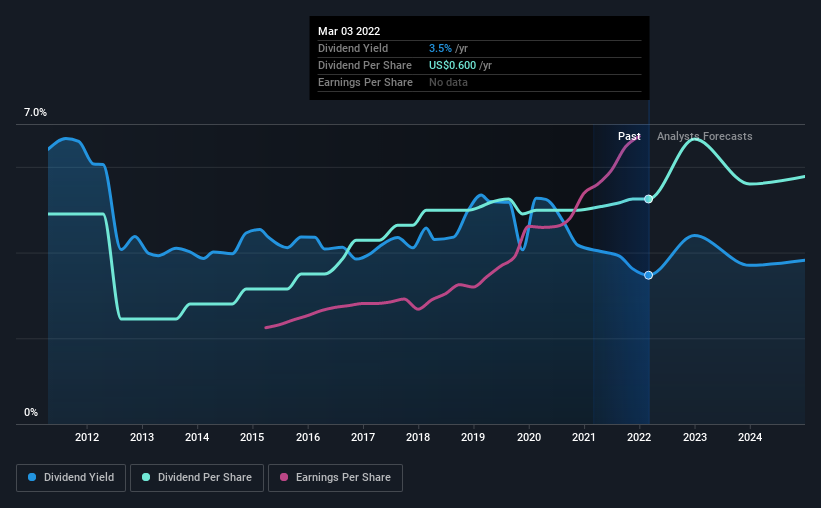Should You Buy United Bancorp, Inc. (NASDAQ:UBCP) For Its Upcoming Dividend?
United Bancorp, Inc. (NASDAQ:UBCP) stock is about to trade ex-dividend in four days. The ex-dividend date is one business day before a company's record date, which is the date on which the company determines which shareholders are entitled to receive a dividend. The ex-dividend date is important as the process of settlement involves two full business days. So if you miss that date, you would not show up on the company's books on the record date. Accordingly, United Bancorp investors that purchase the stock on or after the 9th of March will not receive the dividend, which will be paid on the 18th of March.
The company's next dividend payment will be US$0.30 per share. Last year, in total, the company distributed US$0.60 to shareholders. Calculating the last year's worth of payments shows that United Bancorp has a trailing yield of 3.5% on the current share price of $17.285. We love seeing companies pay a dividend, but it's also important to be sure that laying the golden eggs isn't going to kill our golden goose! As a result, readers should always check whether United Bancorp has been able to grow its dividends, or if the dividend might be cut.
Check out our latest analysis for United Bancorp
Dividends are typically paid from company earnings. If a company pays more in dividends than it earned in profit, then the dividend could be unsustainable. United Bancorp paid out a comfortable 34% of its profit last year.
When a company paid out less in dividends than it earned in profit, this generally suggests its dividend is affordable. The lower the % of its profit that it pays out, the greater the margin of safety for the dividend if the business enters a downturn.
Click here to see how much of its profit United Bancorp paid out over the last 12 months.
Have Earnings And Dividends Been Growing?
Businesses with strong growth prospects usually make the best dividend payers, because it's easier to grow dividends when earnings per share are improving. Investors love dividends, so if earnings fall and the dividend is reduced, expect a stock to be sold off heavily at the same time. For this reason, we're glad to see United Bancorp's earnings per share have risen 17% per annum over the last five years.
Many investors will assess a company's dividend performance by evaluating how much the dividend payments have changed over time. Since the start of our data, 10 years ago, United Bancorp has lifted its dividend by approximately 0.7% a year on average. Earnings per share have been growing much quicker than dividends, potentially because United Bancorp is keeping back more of its profits to grow the business.
The Bottom Line
From a dividend perspective, should investors buy or avoid United Bancorp? When companies are growing rapidly and retaining a majority of the profits within the business, it's usually a sign that reinvesting earnings creates more value than paying dividends to shareholders. Perhaps even more importantly - this can sometimes signal management is focused on the long term future of the business. United Bancorp ticks a lot of boxes for us from a dividend perspective, and we think these characteristics should mark the company as deserving of further attention.
So while United Bancorp looks good from a dividend perspective, it's always worthwhile being up to date with the risks involved in this stock. Every company has risks, and we've spotted 2 warning signs for United Bancorp you should know about.
Generally, we wouldn't recommend just buying the first dividend stock you see. Here's a curated list of interesting stocks that are strong dividend payers.
Have feedback on this article? Concerned about the content? Get in touch with us directly. Alternatively, email editorial-team (at) simplywallst.com.
This article by Simply Wall St is general in nature. We provide commentary based on historical data and analyst forecasts only using an unbiased methodology and our articles are not intended to be financial advice. It does not constitute a recommendation to buy or sell any stock, and does not take account of your objectives, or your financial situation. We aim to bring you long-term focused analysis driven by fundamental data. Note that our analysis may not factor in the latest price-sensitive company announcements or qualitative material. Simply Wall St has no position in any stocks mentioned.

